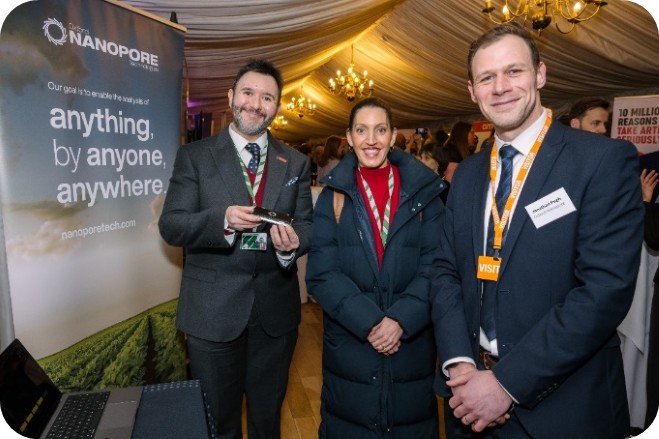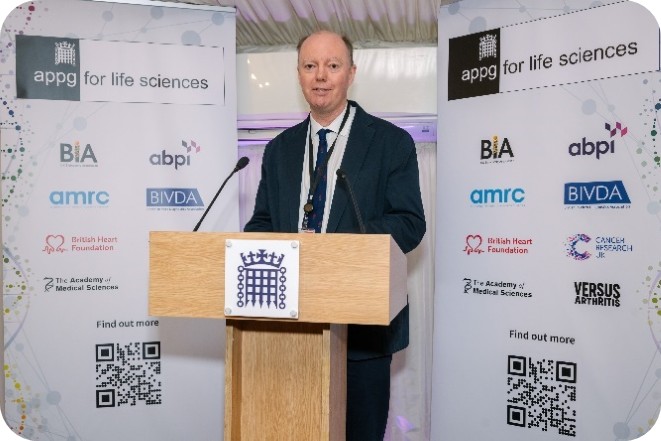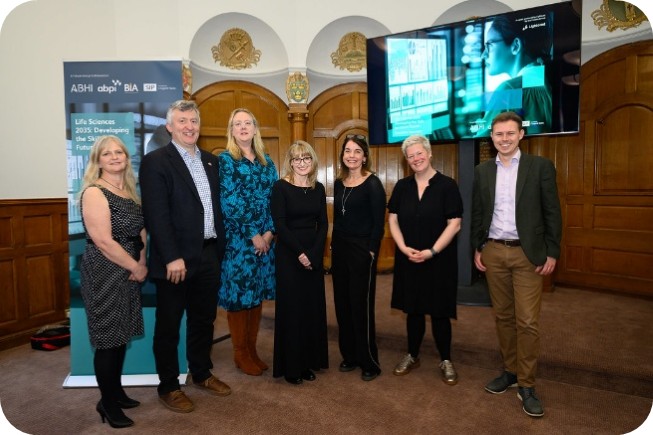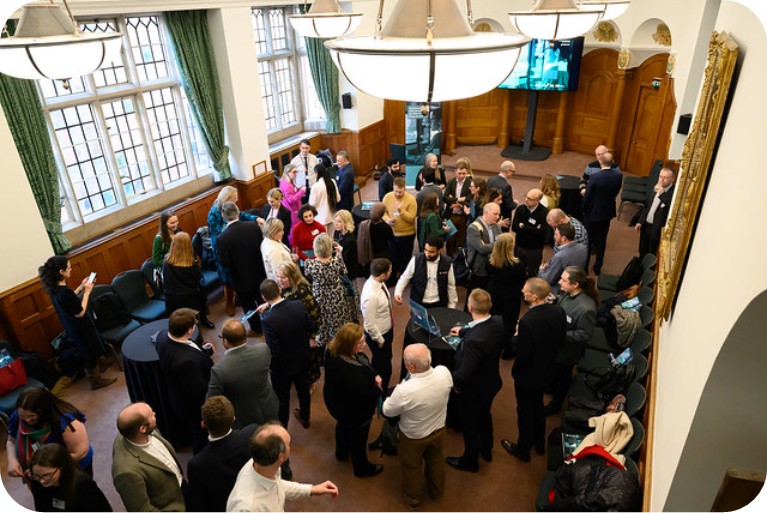
Introduction
We kicked off 2025 with real energy, both in our policy work and at our Gala Dinner at the Camden Roundhouse. The event brought the sector together to celebrate progress, forge new connections, and raise £50,000 for our charity partner Blood Cancer UK. It was a powerful reminder of the human impact behind the innovation we champion. Attending the dinner, Lord Vallance, Minister for Science, Research and Innovation, captured the moment perfectly when he told the room: “The BIA are really listened to by Government and Number 10.”
That influence was clear throughout Q1. The BIA team and our members helped shape the upcoming Life Sciences Sector Plan through active participation in the government’s task and finish groups and through our Advisory Committees, which underpin BIA’s policy platform. From championing scale-up finance and regulatory reform to pushing for smarter trade policy and better access to NHS data, our collective voice is being heard - loud and clear.
We also held a standout Committee Summit at Westminster Central Hall, where our expert Advisory Committees shared priorities with the BIA Board and helped steer the direction of our work for the year ahead. It was fantastic to see so many members engaged in dynamic discussions - and to formally launch our new BIA Communities. These new groups will ensure even more members can contribute to and shape our advocacy and policy agenda. Rounding off the day we heard insights from Kit Malthouse MP, APPG for Life Sciences chair, on how our members can best engage with policymakers to make the case for life sciences in Parliament.
This report captures the breadth and impact of our work this quarter and shows how, together, we’re ensuring UK life sciences remains well-supported and globally competitive. It covers our work up to the end of March, just before Trump announced his tariffs, which will be included in our next report. Keep reading for more updates from the team.

Government and Parliament
BIA and members help shape Life Sciences Sector Plan
The year began with multiple task and finish groups and an overarching advisory group coordinated by the Government to develop the new life sciences sector plan, which is due to be published in June.
BIA had representation on most of these groups, with CEO Steve Bates taking a seat on the advisory group. The Chair of our Data, AI and Genomics Advisory Committee, Steve Gardner, was on the Data group and the Chair of our Rare Disease Industry Group on the Access and Uptake group. BIA’s Chair, Dan Mahony played a pivotal role in BIA’s main area of policy focus in the plan as Chair for the Access to Finance and Investment Task and Finish Group. The groups were tasked with outlining a problem statement for its focus area, as well as a vision for the sector and a number of recommendations for how to achieve it, which were then taken forward by the Office for Life Sciences to achieve consensus from other government departments so that they could be included in the plan.
In March, BIA members also joined two roundtables on the sector plan development, including one at 10 Downing Street, to test themes that had been elicited from the task and finish groups. The roundtables were a chance for members to feedback on the direction of travel and highlight any gaps in the thinking. All feedback and recommendations have now been developed into a draft Life Sciences Sector Plan, which is expected to be published in June, alongside the industrial strategy, 10-year health plan and spending review. BIA continues to advise Government on the development of the plan, to ensure the needs of SMEs are well represented.
Early alignment of the Industrial Strategy and BIA priorities

This quarter the BIA was able to review the Government’s initial findings from the Industrial Strategy consultation, with a focus on the themes emerging from across the priority sectors. We were encouraged to see that many of the key points raised by the BIA in our submission to the initial consultation were present in the analysis.
Notably, access to finance emerged as a key barrier to growth for many businesses, with particular attention paid to the substantial impact this has on SMEs. This is closely aligned with BIA messaging on both the importance of SMEs, and the disproportionate impact that a lack of investment has on pre-revenue businesses.
Beyond the section on encouraging investment, BIA’s messaging is present in each section of the analysis from regulatory environment to innovation and technology adoption. Though this is a relatively early step in the development of the Industrial Strategy, it is a good indicator that many of our, and our member’s, priorities may feature in the final version. The BIA will continue to closely monitor the progress of the strategy
BIA CEO argues for better life sciences backing at Business and Trade Committee inquiry
In March, Steve Bates OBE, Chief Executive of the BIA, gave evidence to the House of Commons Business and Trade Committee’s industrial strategy inquiry.
Steve set out why a coordinated Sector Plan is needed to align the key components for success and unlock the full potential of UK life sciences . He presented international examples of governments actively fostering strong life sciences ecosystems and stressed the need for the UK to follow suit, highlighted the importance of improving the financing environment and prioritising UK SMEs’ access to national health datasets.
Joining Steve on the panel were Audrey Yvernault, Vice President of Global Corporate Government Affairs and Policy at GSK, and Sir John Bell, President of the Ellison Institute of Technology.
Champion innovators in trade strategy, says BIA
The BIA submitted a response to a government consultation on the UK Trade Strategy. The consultation sought industry perspectives on the best way to support and protect UK businesses in international contexts whilst facilitating trade to drive growth.
To ensure the strategy meets the sector’s needs, we recommended close coordination of the relevant government teams and agencies; fostering cooperation and enhancing their expertise in the business models of innovative industries. We believe that the strategy should prioritise tariff reduction in trade agreements, regulatory cooperation and the pursuit of bilateral and multilateral partnerships, to ensure that the UK maintains a strong and influential voice.
At the heart of our response, we urged the government to champion innovators and embed their needs and ambitions into the broader trade strategy to both drive sustained growth and competitiveness.
BIA highlights the key life science investment priorities in our response to the Spending Review
The BIA has submitted its response to HM Treasury for the Spending Review 2025, which will determine government spending priorities from 2026 to 2030. The review looks to prioritise the delivery of government’s missions, such as kick starting growth, and building an NHS fit for the future. This is an important point for Government, as spending for the coming 3 years, including for the Life Sciences Sector Plan and Industrial Strategy, will be determined by this review.
We have long asserted the potential of the life sciences for growth, and we were greatly encouraged to see that Government had designated the sector as one of the eight priority sectors under the Industrial Strategy.
Our submission argues that by focusing on these few core areas – building a supportive and well-resourced regulatory environment; ensuring sufficient access to infrastructure, advanced manufacturing, and talent; and driving investment from both domestic and international sources – government can create an even stronger, faster-growing, and more resilient sector, better placed to deliver innovation and economic growth to the UK.
This submission represents the BIA’s initial input, where we outline the tentpole areas of spending that government should focus on. However, as the Life Sciences Sector Plan develops, and more granular bids and initiatives arise, the BIA will continue to lobby for those that will best support the sector.
APPG for Life Sciences Relaunches at Parliamentary Reception
The All-Party Parliamentary Group (APPG) for Life Sciences held its inaugural parliamentary reception in February, bringing together MPs, Peers, and sector leaders to showcase the UK’s cutting-edge life sciences innovations. The event served as a platform to highlight the vital contributions of life sciences to both the NHS and the UK economy. Around 200 stakeholders including 20 parliamentarians attended, representing the great and the good of the UK life sciences ecosystem.
Keynote speeches from APPG Chair Kit Malthouse MP and England’s Chief Medical Officer, Professor Sir Chris Whitty, underscored the sector’s importance and its future potential. Attendees had the opportunity to explore showcases of pioneering research projects and companies. These included Oxford Nanopore’s genomic sequencing technologies, which are being used to bolster national biosecurity and fight antimicrobial resistance in NHS hospitals.
Professor Chris Whitty speaking at the reception; Kit Malthouse MP, Sadik Al-Hassan MP and Rosena Allin-Khan MP learning about different examples of biotech innovation
The APPG for Life Sciences exists to raise awareness and understanding of the sector’s contribution to the nation’s health and economy, as well as the role of charities, industry, and academia in funding and driving medical research and commercialisation. BIA provides the secretariat to the APPG in collaboration with the Association of Medical Research Charities, with support from other industry, charity and academic partners.BIA strengthens UK-Japan life sciences ties on ministerial trade visit
The BIA was invited by the Foreign Secretary and Business Secretary to join them on a visit to Japan in March, representing the UK life science sector as part of a high-profile delegation focused on the key sectors driving economic growth.
The visit provided an opportunity to deepen the UK-Japan partnership, a relationship further solidified by the 2023 Hiroshima Accord and the UK’s 2024 entry into the Comprehensive and Progressive Agreement for Trans-Pacific Partnership (CPTPP).
During a series of roundtables and meetings in Tokyo, BIA CEO Steve Bates emphasised the strength of the UK life sciences ecosystem to Japanese investors and potential partners. He highlighted key areas of collaboration, such as the work of FUJIFILM Diosynth Biotechnologies, and made new connections with investors like SoftBank, who are eager to explore the convergence of AI and life sciences. Japan’s focus on digital transformation and green innovation aligns closely with UK sector priorities, and there is optimism about future collaborations. The BIA expects further opportunities to engage with Japanese partners in the months ahead.
Business Environment
Finance and tax
Tax Minister proposes changes to R&D tax advance clearances following meetings with BIA
Tax Minister James Murray MP met with BIA, businesses and trade other associations in February to understand the views of industry on the R&D tax relief advance clearance scheme ahead of announcing changes that could benefit life sciences. Advanced clearances are available to businesses who wish for HMRC to provide a provisional assessment of a company’s eligibility to claim R&D tax reliefs before a full claim is submitted.
BIA’s Finance and Tax Advisory Committee (FTAC) Chair, Melissa Strange, joined the February roundtable to share our members’ experiences of the scheme, which is generally not used by life science companies.
At beginning of this year, the BIA and our R&D tax relief subcommittee also met with HM Treasury and HMRC officials to discuss the scheme, which led to the ministerial roundtable.
HMRC has now launched a consultation proposing to make advanced clearances mandatory for certain sectors deemed more likely to make invalid R&D tax claims. It is hoped that this will allow HMRC resources to be better focused on high-risk sectors and reduce burden on low-risk sectors like life sciences, which would not have to seek advanced clearance. Such a “fast lane” approach was suggested by BIA CEO when we met Minister Murray in December 2024.
Spring statement reveals next steps for key BIA issues
The Spring Statement from Chancellor Rachel Reeves launched several formal consultations that represent important next steps for issues that the BIA have been directly engaging government on. These include advance clearances, and the crack down on fraud and non-compliance within R&D tax relief schemes.
- Financing and scaling UK science and technology: Innovation, investment, industry – House of Lords Science and Technology Committee
- National Wealth Fund – Treasury Committee
- R&D tax relief advance clearances – HMRC
- Small business access to finance – DBT, HMT
- Enhancing HMRC's ability to tackle tax advisers facilitating non-compliance – HMRC
- UK Research and Innovation – PAC
- Stamp Duty and Stamp Duty Reserve Tax exemption for PISCES transactions - HMRC
These consultations reveal a commitment from government that they will continue engaging with issues of direct relevance to the sector. The BIA will be responding to many of these consultations, with further updates to follow as the consultations progress.
UK biotech funding increase revealed in BIA data

BIA published its annual finance report at the end of January, showing an improving picture compared to the past two years. UK biotech raised £3.7 billion in 2024, a 106% increase from 2023.
£2.25 billion was secured in venture capital, a 79.5% increase from 2023, with notable strength across all quarters. North American investors increased their share of funding, particularly in later-stage deals, while seed-stage investment saw a decline in domestic participation.
No IPOs occurred in 2024, continuing 2023’s trend due to market uncertainties, though optimism for future recovery remains. £1.5 billion was raised through follow-ons financing, a 170% increase from 2023, with Nasdaq the dominant source for UK biotech fundraising.
Grant funding fell to £33 million with a 30% drop in average grant size, indicating reduced non-dilutive funding for biotech during year of UK government change. BIA is currently engaging with the government on the spending review, which will set budgets for Innovate UK up until 2030, with the aim of improving levels of grant funding.
IP and tech transfer
BIA expresses remaining concerns over new global biodiversity mechanism to CBD
In November last year, signatories to the Convention on Biological Diversity (CBD) agreed to implement a multilateral benefit sharing mechanism for the use of Digital Sequence Information (DSI), , with commercial users of DSI from the biotech, pharmaceutical and other sectors to contribute to a new global biodiversity fund. Shortly after, the CBD published four consultations to further cement some of the details of the mechanism and its governance, and the new Cali Fund is now operational.
In March, BIA responded to the second consultation that sought broad views on the operationalisation of the fund. We highlighted the need for the CBD to recognise biotech’s existing contributions to biodiversity, and the need for clarity and business certainty on multiple items of the decision, including the stacking of obligations for users, details of how the funds will be used to benefit biodiversity, and the status of human-derived DSI.
In April, BIA will be responding to the fourth consultation which seeks to identify the thresholds for SMEs to contribute to the fund.
Amidst ongoing Copyright & AI debate, BIA shares biotech perspective

In February, the BIA responded to the joint Intellectual Property Office (IPO), Department for Science, Innovation and Technology (DSIT) and Department for Culture, Media, and Sport (DCMS) consultation on Copyright and AI.
In our submission, we highlighted the importance of AI and data access in the life sciences sector, and its use by UK techbio companies. We supported the Government’s suggested changes to UK copyright law in the form of a data mining exception which allows rights holders to reserve their rights, underpinned by supporting measures on transparency. Considerations will have to be made around the use of synthetic data used to train AI models.
The submission follows on from the BIA's 2022 submission to the IPO's 2022 consultation on AI & IP focused on copyright and patents. BIA continue to work closely with our IP and techbio experts to ensure any legislative changes are supportive of innovators in the life sciences sector.
BIA IP leads discuss sector needs with UK IP attachés to North America and China
In February, BIA met with the UK’s IP attaché to North America, Kayleigh Nauman, in London. Bringing together IP leads from life sciences and biotech members, we discussed the impact of US policy developments on UK life sciences, the issues and barriers UK life sciences companies are encountering in the North American markets, and where the UK can take action abroad to support our sector. This was followed by a roundtable with the UK's IP attaché to China, Samuel Stone, in March, there our IP leads discussed the current patents and IP policy landscape in China and shared their experiences.
Both roundtables were a welcome opportunity to discuss where the UK can impact those markets and what our industry can do to help influence progress on the global IP policy agenda. In April, BIA life sciences IP experts will meet with the global cohort of UK IP attachés. The meeting will be a significant and unique opportunity to put the needs of the biotech sector at the forefront of the global IP agenda.

BIA members meeting with the UK’s IP attaché to North America, Kayleigh Nauman
Regulation and Access
Engagement with MHRA continues on new clinical trials guidance
Following the tabling of new legislation to modernise the regulation of clinical trials in the UK, the MHRA has been working with stakeholders to develop new supporting guidance documents. The BIA has engaged closely with the MHRA on the development of the new guidance, including by providing detailed feedback from our members on an early draft before publication. On 25 February, the MHRA held a webinar to share analysis of the feedback received on the draft guidance and specify where changes have been made as a result. We were pleased that a number of changes had been made in line with the feedback provided by BIA members, including to improve clarity around the process for applying for a clinical trial approval. We look forward to receiving the next iteration of the feedback in due course and will continue to engage closely with the MHRA to share feedback from BIA members.
Key changes to NICE’s HST routing criteria secured after BIA’s consultation response and continued advocacy
The BIA responded to NICE’s consultation on changes to its Highly Specialised Technologies (HST) routing criteria, which is the programme NICE uses to assess treatments for ultra-rare diseases that meet specific entry criteria. The aim of the consultation was to enhance the clarity and predictability of routing decisions without changing the intent or essence of the criteria.
In our response, which was developed with input from BIA membership, we emphasised a number of concerns with the proposals that would restrict the number of ultra-rare disease medicines that are routed through the HST programme and made available to patients. We urged NICE to ensure the criteria align with the aims of the UK Rare Disease Framework and wider government ambitions around growing the UK life science sector.
BIA wrote to Ashley Dalton, Minister for Public Health and Prevention, urging her to review this issue to ensure patients can benefit from promising treatments that can transform their care. We also secured parliamentary questions that were tabled to raise awareness of the potential impact of the proposals on patient access.
During the NICE board meeting on 19 March, NICE’s revisions to the criteria post consultation were approved. The BIA was pleased to see that following our consultation response and engagement the following key changes to the criteria were made:
Despite these positive changes, we remain concerned that the new criteria will result in a tightening of criteria and fewer products will be routed to HST, potentially limiting patient access to these medicines. The BIA will continue to engage with NICE to monitor the impact of these changes as the revised criteria are implemented.
New Rare Disease Action Plan for England published on Rare Disease Day
To mark Rare Disease Day, the BIA published a blog emphasising the significant barriers in the UK that need to be addressed to improve patient access to vital treatments for rare diseases in the NHS. We also signaled our support for calls to continue the crucial work of the UK Rare Disease Framework beyond its current remit in 2026 to ensure new ambitions are set that drive action and coordination on rare diseases across the four nations and between stakeholders. Rare Disease Day is an important occasion to raise awareness of the complex challenges faced by people living with rare diseases and their families.
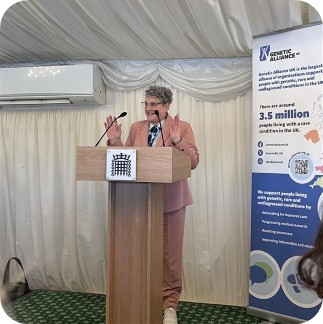
Ashley Dalton, Minister for Public Health and Prevention, at the Rare Disease Day reception
BIA also attended Genetic Alliance UK’s annual Rare Disease Day parliamentary reception, during which we were pleased to see Ashley Dalton, the new health minister with responsibility for rare diseases, champion the importance of ensuring that people living with rare diseases should be at the heart of NHS reform and the upcoming 10 Year Health Plan.
Coinciding with Rare Disease Day, the Department for Health and Social Care published the 2025 England Rare Disease Action Plan to report on progress made against implementing the priorities of the Framework. BIA is pleased that Action 25, which is for DHSC to collaborate across the regulatory system to review the effectiveness of these pathways for rare diseases,will be extended following our close engagement. So far this has involved meeting with NHS England, NICE and MHRA last year to discuss the joint BIA and ABPI member survey on the challenges specific to those developing and accessing new rare disease therapies.
We welcome that Action 25 also includes the commitment for delivery partners to meet annually with key stakeholders, including BIA and member representatives, to continue to discuss progress and the role of specific pathways in supporting access to rare disease treatments. The next of these meetings will take place in summer 2025 and the BIA and our members look forward to continuing to engage with partners as this work progresses.

New Industry Advisory Group for ILAP to be co-chaired by BIA
Following the launch of the refreshed Innovative Licensing and Access Pathway (ILAP), the BIA has been invited to co-chair a new Industry Advisory Group alongside the ABPI. The Industry Advisory Group, which will also include representatives from BIA and ABPI member companies, will share insights and make recommendations to the ILAP Management Board to support ILAP’s success and continuous improvement.
We welcome the ambition for the new ILAP to be the world’s first fully integrated end-to-end access pathway, a development which we hope will support faster access to the most innovative new medicines for patients in the NHS. The new pathway also introduces more tailored support and predictable timelines for developers. The eligibility criteria for ILAP have been revised, including to limit applications to medicines that have not yet entered their confirmatory trial. Applications for the new ILAP opened on 31 March 2025.
BIA supports MHRA in shaping world-first framework for point of care manufacturing
The MHRA has been engaging with the BIA and other stakeholders to support the implementation of new UK regulations for decentralised manufacture of medicines, including point of care and modular manufacture, which will come into effect on 23 July 2025. In March, the BIA was pleased to attend an in-person workshop hosted by the MHRA to discuss feedback on the draft guidance, which covers areas including clinical trial authorisations, good manufacturing practice (GMP), marketing authorisations and pharmacovigilance. We look forward to continuing to engage with the MHRA as the guidance is developed.
The new regulatory framework, which is the first of its kind in the world, will enable innovative products to be manufactured at or close to the location where a patient receives care. This will allow for medicines with a very short shelf life and highly personalised medicines to be made in or near a hospital setting and can get to the patients who need them safely and much more quickly. The regulation will also enable the manufacture of innovative medicines in small, portable units that can be set up close to patients who may be too sick to travel or where rapid medicine availability is best served.
BIA respond to the MHRA's draft guidance on individualised mRNA cancer immunotherapies
We have welcome the MHRA’s recently published draft guidance on individualised mRNA cancer immunotherapies . In a letter to MHRA, we welcomed the agency’s focus on supporting innovation in mRNA research by providing a clear and streamlined regulatory pathway to approval for individualised mRNA cancer therapies. This is an important first step in providing a supportive regulatory environment for mRNA technologies, and we are pleased that the MHRA may expand the guidance to cover other types of highly personalised therapies in due course.
We look forward to continuing to engage with the MHRA as the guidance is finalised and to explore ways in which we can collectively advance this vital area of biotechnology.
UKBSC responds to Animals in Science Committee consultation on leading practice
In March, the UK Bioscience Sector Coalition (UKBSC), that BIA are a member of, responded to the Home Office Animals in Science Committee (ASC) consultation on strengthening leading practice in the animal science sector. The consultation reviews how the sector currently develops, shares and uses leading practice for replacement, reduction and refinement (the 3Rs) of animals in research.
The UKBSC response highlighted the role of the National Centre for the Replacement, Refinement & Reduction of Animals in Research (NC3Rs) as a national lead in implementing the 3Rs in the UK, and identified barriers to embedding a culture of leading practice, including roles and responsibilities of key actors in the sector.
The BIA engages closely with the Home Office on animal science policy and regulation in the UK, and is a signatory of the Concordat on Openness on the Use of Animals in Research.
Skills and Talent
BIA collaborate to publish Life Sciences Skills Analysis 2035
This brings the total workforce demand to 145,000 skilled employees by 2035. To meet this demand, the report calls for increased investments in education and training, the promotion of lifelong learning, and the creation of more inclusive workplaces to attract and retain a diverse talent pool. Shared goals for industry, government and education and skills ecosystem partners include focus on; Innovation and Technology Integration, Career Pathways, Global Leadership and Sector Attractiveness. Skills Minister Jacqui Smith MP gave an initial address at the launch event supported by Ros Campion, Director of the Office for Life Sciences.
Kate Barclay MBE, BIA skills consultant, with Futures Group colleagues launching the Skills 2035 report in Westminster
BIA publish Women in biotech leadership; Representation at C-suite report
In March BIA published the first-of-its-kind Women in Biotech Leadership Report, offering a deep dive into gender representation at the CEO and C-suite level in UK biotech companies. This report sheds light on barriers that still exist for women in leadership positions and those aspiring to reach these roles, demonstrates the progress being made in representation and highlights the challenges that remain in the sector, particularly in securing investment, overcoming bias, and achieving inclusive leadership at the highest levels.
By highlighting these issues, BIA hope to encourage meaningful conversations and drive action toward a more inclusive sector.
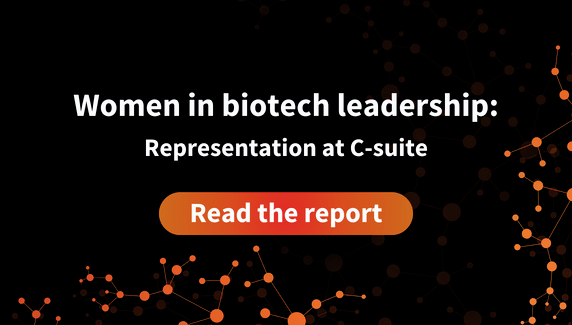

Launching the report, celebrating and connecting female leaders in Biotech at Hinxton Hall
UK government recognises BIA’s #BIGIMPACT campaign

Launched to attract young computational and tech talent into biotech, the BIA’s #BIGIMPACT campaign aims to compete with fintech and big tech by highlighting the meaningful, diverse careers available in life sciences. Despite being only in its third year, the initiative has gained recognition from industry and government for its impact. At the launch of the Life Sciences 2035: Developing the Skills for Future Growth report in March, Ros Campion, Director of the Office for Life Sciences, cited #BIGIMPACT as a prime example of industry-led efforts to attract digital talent
In early 2025, the campaign entered its second phase, featuring paid ads and curated social media content. Within the first three weeks, it generated over 20,000 impressions.
Developed from BIA’s Genomics, Data and AI Committee recommendations, the campaign received positive feedback at the BIA’s Committee Summit in February, affirming its value to member companies.
By reaching key industry stakeholders and securing government recognition, the campaign continues to gain momentum, helping to bridge the digital skills gap in life sciences, and ensuring the sector remains competitive.
Manufacturing
BIA helps drive oligonucleotide revolution with the launch of new explainer
Oligonucleotide therapies are rapidly emerging as a powerful force in medicine manufacturing, with growing potential to treat larger patient populations beyond rare diseases. Recognising the UK’s opportunity to lead in this transformative area, the BIA has taken a proactive role in advancing understanding and collaboration across the sector.
In this emerging industrial space, solving manufacturing challenges is key to the successful delivery of new therapies. As part of the complex medicines series, the new BIA explainer aims to demystify the science, history, the opportunity and the manufacturing challenges of oligos to non-experts, including policy makers. It introduces some of the key UK players who are at the forefront of this exciting field, highlights the need for further investment and explains how we can establish ourselves amongst global industrial leaders in this transformative technology area. The report was formally launched at the annual oligos networking event, hosted by AstraZeneca.
BIA engages in discussions on sustainable NHS Mandate at parliamentary roundtable
BIA attended a roundtable to advocate for the important role of medicines manufacturing in sustainability. Hosted by Baroness Ritchie, the roundtable was held with the APPG on Health and Sustainable resources to make recommendations for the governments long term healthcare planning and the next NHS mandate.
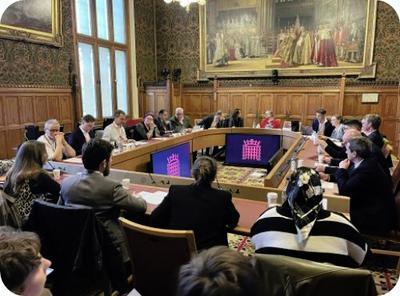
BIA participating in the APPG on Health and Sustainable resources roundtable. Source: Policy Connect
The government's NHS mandate will set a framework for NHS leaders to manage services and prioritise issues such as innovation and technology adoption. It is estimated that the use of medicines account for 25% of total emissions from the health service, therefore it is essential to promote a more sustainable medicine manufacturing landscape.
The BIA encourages funding programmes centered around sustainable innovations within the medicines manufacturing sector. To ease the adoption of newer and more sustainable technology, regulators and industry must collaborate to form a framework to overcome the regulatory bottleneck. Legacy process changes need to be accessible from a regulatory perspective, allowing companies to swap out manufacturing process elements for more sustainable alternatives.
Critical Technologies
Deep Biotech
BIA publishes deep biotech policy recommendations
Based on extensive member engagement in 2024, the BIA published a policy paper which sets out recommendations that would enable deep biotech companies to scale and succeed in the UK.
The policy recommendations on regulation, finance, and infrastructure indicate what public policy levers and Government support are needed to make significant progress for UK deep biotech. The paper was shared with over 300 policy makers from across Westminster, Whitehall and beyond, and was received with interest by key Government stakeholders including Lord Willets (chair of RIO), Dame Angela McLean, (Chief Scientific Adviser) and Steve Yemm MP, which led to a meeting on 26 March. Moving forward BIA will continue to work with Government and our members to ensure that the recommendations are implemented.
Engineering Biology
BIA highlights engineering biology regulatory challenges to regulators
On 20 February, BIA had the unique opportunity to present to the Engineering Biology Regulators Network (EBRN) and the Regulatory Innovation Office (RIO) on the regulatory challenges faced by innovative engineering biology SMEs. The EBRN is a unique cross-government forum bringing together 12 regulators, and stakeholders from across a wide range of Government departments, to share best practice on pro-innovation regulation, identify common challenges, and collaborate on solutions.
Structured around seven BIA member case studies spanning health, chemicals, agriculture, food, and materials, the presentation illustrated the regulatory hurdles that companies encounter, and reflected the broader challenges across the sector. The case studies were received with great interest by the regulators, who will be looking to improve the landscape for these companies.
BIA will build on the case studies to continue important industry-regulator engagement, and encourage regulators to apply for the second round of the engineering biology sandbox fund.
BIA influences Regulatory Horizons Council’s report on engineering biology
In January, the Regulatory Horizons Council (RHC), an independent committee that monitors technological innovation and provides government with advice on the regulatory reform required to support its adoption, published a long-anticipated report on the Governance of Engineering Biology. The BIA fed into the drafting of this report, providing feedback to ensure the perspective of engineering biology SMEs was considered.
The report outlines a framework for regulating the wide variety of products derived from engineering biology as a platform technology, and makes six key recommendations. The recommendations include that regulations should focus on the merits of the products, not the process by which they were derived, and that there should be more collaboration between innovators and regulators to support regulatory understanding of the innovative potential of engineering biology. We are currently awaiting the Government’s response, which is expected in Spring.
TechBio & Genomics
Joint trade associations report makes recommendations on NHS data infrastructure
BIA, together with other trade associations, published the report “Unlocking NHS data for research” which outlines what the life science sector needs from the NHSE regional SDE network. The report made five recommendations on a range of issues including what data to prioritise, providing a single-entry point to the service and forming an external advisory group. Access to health data – especially NHS data – is a key policy priority for BIA members. The publication of this report will highlight our key business needs, building on our existing relationship with the NHSE data for R&D programme.
The report is a collaboration between BIA, the Association of the British Pharmaceutical Industry (ABPI) and the Association of British HealthTech Industries (ABHI). The recommendations, therefore, cover the full spectrum of the life science sector, and have already been influential in the development of the programme.
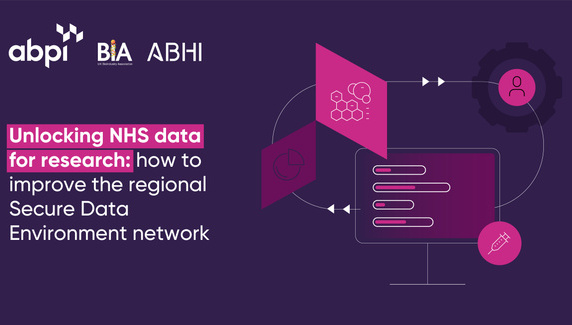
Find out more about the NHS data for R&D programme
BIA calls for the UK’s health data assets to address industry representation on boards
BIA has written to the UK’s four national data assets calling on them to add an SME representative on their advisory boards. UK Biobank, Genomics England, Our Future Health and NHSE are all globally recognised data resources vital to research and innovation. But increasingly the needs of SMEs in the life science sector are not being considered in the running of these resources.
Improving industry representation on these advisory or oversight boards will improve the understanding of innovators in the life science sector, who often have different technical needs or timeframes to academics and other users.
BIA called for industry representation along with ring-fenced funding for SMEs and the publication of metrics on users. We hope that in time improvements to these initiatives will lead to an increase in the number of UK SME users and will be meeting with Government to discuss this joint ask in the upcoming weeks. Find out more about our data access work
Read the report


